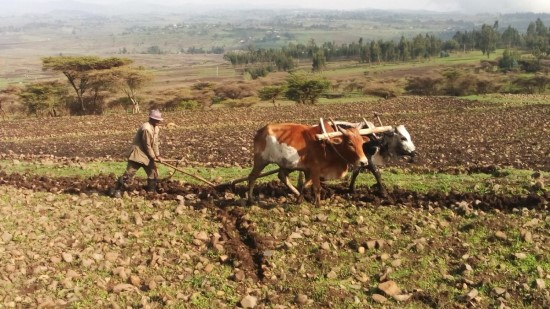
20 Aug Implementing One Health Approach is a Must in Ethiopia: Podcast with Abraham Ali Mohammed
Audio interview with HRH2030 One Health Ethiopia Multisectoral Advisor Dr. Abraham Ali Mohammed (Running time 7:02)
August 11, 2020 marked the fifth month since the World Health Organization  declared COVID-19 a pandemic. This same week, HRH2030 sat down with Dr. Abraham Ali Mohammed, the program’s multisectoral advisor for health security in Ethiopia, to discuss the One Health activity there and its approach to infectious disease threats.
declared COVID-19 a pandemic. This same week, HRH2030 sat down with Dr. Abraham Ali Mohammed, the program’s multisectoral advisor for health security in Ethiopia, to discuss the One Health activity there and its approach to infectious disease threats.
HRH2030’s One Health activity supports efforts to implement the Global Health Security Agenda, which is a partnership of more than 64 nations working on prevention, early detection, and rapid response to infectious disease threats, with a focus on zoonotic diseases. As we talk from opposite sides of the world today, our communities share a common –albeit horrific—bond. We’re all doing our best to protect ourselves and fight the same infectious disease, COVID-19. Before we delve into your work on One Health, I’d like to ask you how Ethiopia has responded to COVID?
Ethiopia has the second largest human population in Africa, and as has been communicated through different websites as of today, a total of 25,180 confirmed COVID-19 cases and 463 associated deaths. Only major cities have hospitals with full-time physicians, and most of the hospitals are in Addis Ababa. Access to modern health care is very limited, and in many rural areas it is virtually nonexistent. Fear of dealing with the virus in the context of a weak health system and a vulnerable economy, energized the country’s leadership to impose early and stringent measures in March. This was followed by the declaration of a five-month state of emergency in April.
Overall, our government has imposed similar safety measures as other countries, but for Ethiopia—where the majority of people live in rural areas with weak transportation and communication links—they transpire a bit differently. To give you some examples in relation to the agricultural setting, the farmers are informed or educated to plant or plow their lands and also to harvest their agricultural products by keeping the relevant social distancing measures.
As you noted, the majority of Ethiopians live in rural areas, so I have a data point to share. Ethiopia has the continents largest livestock population and approximately 80 percent of the population are dependent on agriculture and have direct contact with livestock or other domestic animals every day. This brings me to your work on One Health to support Ethiopia’s prevention and control efforts against infectious diseases. In particular, you focus on trying to minimize the ongoing threat of zoonotic diseases from regular animal-human interaction by improving multisectoral coordination and collaboration. Can you explain for us, Dr. Abraham, how the One Health activity is working amidst the corona virus? How do you keep the balance between health system demands from COVID and your ongoing zoonotic health priorities?
One Health efforts—the interdisciplinary health interventions that addresses how human illnesses are connected to diseases from animals and the environment—are critical in Ethiopia, as you noted, because our economy and livelihood depend heavily on agriculture and livestock. Our One Health activity works with a variety of key ministries and organizations, like the Ministry of Health, Ministry of Agriculture, Ethiopian Wildlife Conservation, and Ethiopian Forest Climate Change, to strengthen capacity to effectively prevent, detect, and respond to zoonotic disease threats, and ultimately ensure the country’s ownership and sustainability of these efforts.
HRH2030 has been successful in increasing multisectoral coordination and collaboration by organizing and facilitating a variety of trainings and even realistic scenarios to test Ethiopia’s proposed response to a zoonotic disease outbreak globally, regionally, and domestically. For instance, I know you have a news story on our Tabletop Simulation exercise from last year testing our Preparedness and Response Plan to a fictitious outbreak of the Highly Pathogenic Avian Influenza.
During the COVID times, I believe our work has laid some critical groundwork for emergency preparedness and response. Our technical assistance to facilitate coordination of the National Action Plan for Health Security activities has strengthened the leadership and governance of the health system. We have—and continue to work towards—improving transparency, strengthening policies and practices, and improving multisectoral collaboration.
Now with COVID-19, our One Health objective to minimize the transmission of zoonotic diseases from animals to human populations remains unchanged, but now we are simply working a bit differently. For instance, currently we are establishing or creating a virtual means to enable the National One Health platform and its technical working group to continue their regular activities.
How do you envision the future of One Health—what is your argument for Ethiopia to continue its multisectoral efforts and to keep the spotlight on zoonotic disease prevention in particular?
In the future, One Health will be institutionalized and fully integrated with a government system of all the nations. This is because One Health is a must, not an option, in order to accelerate activities to address environmental and biological traits on the global scale.
One Health is a must—not an option.
Thank you so much for joining us today, Dr. Abraham. Listeners, you’ll find more news pieces and information on the HRH2030 One Health activity on our hrh2030program.org website. And don’t forget, you can always stay up to date on all the latest and greatest from HRH2030 through our Twitter and Facebook channels. Goodbye, Dr. Abraham.
Thank you; goodbye.
Photo: Farming in Ethiopia oftentimes involves cattle. Ethiopia has Africa’s largest livestock population and approximately 80 percent of its population is dependent on agriculture and have direct contact with livestock or other domestic animals. As such, the work of One Health to prevent zoonotic diseases is vital. Credit: Wikimedia Commons






